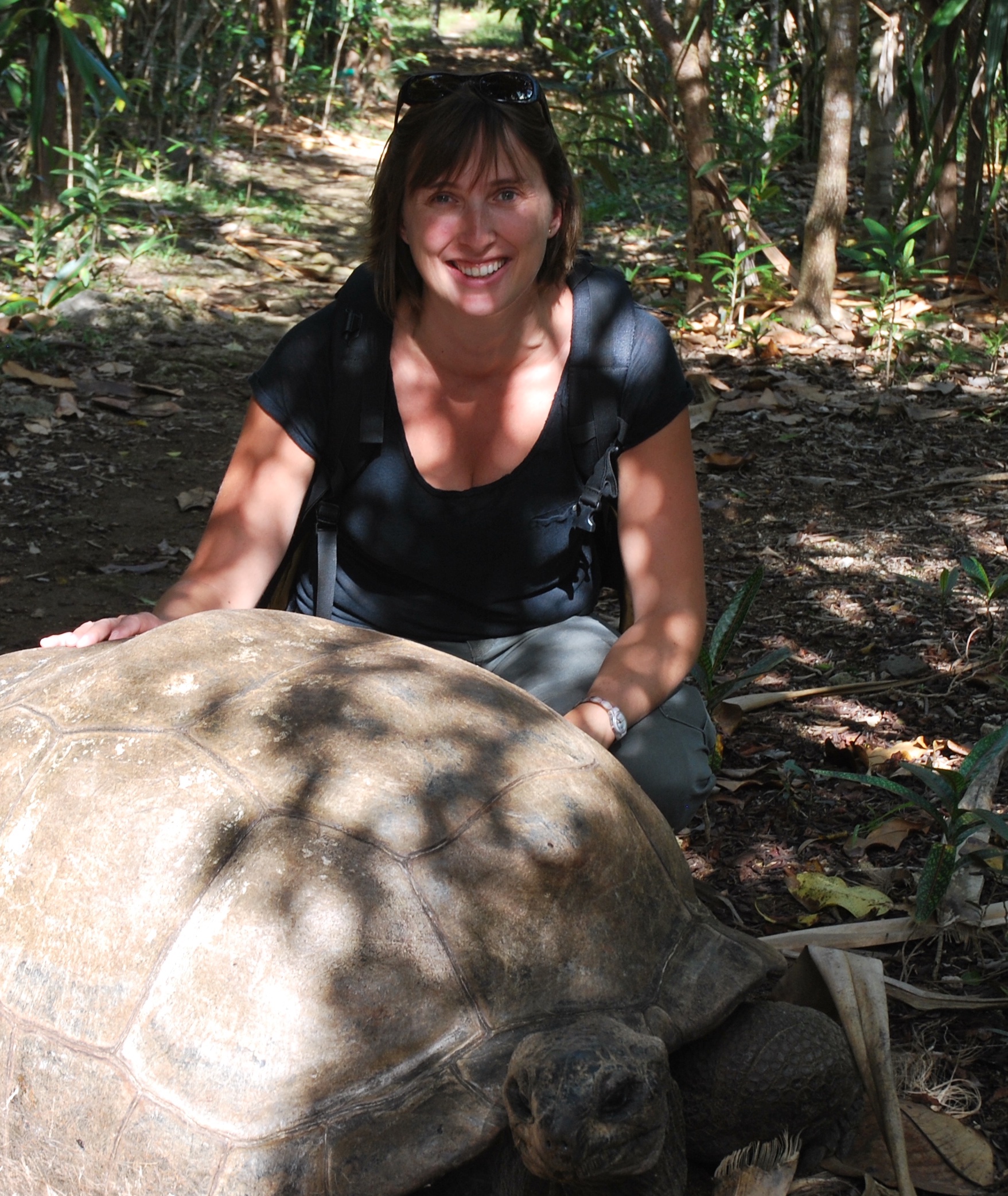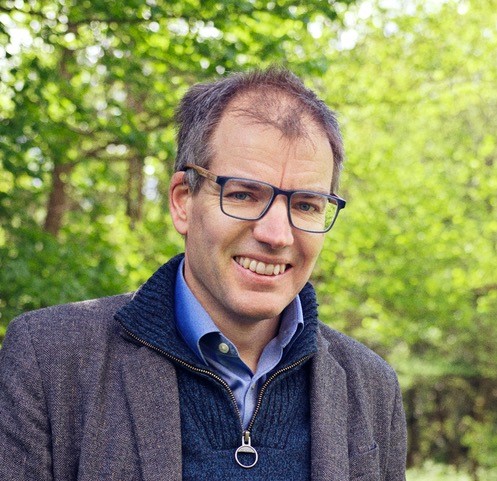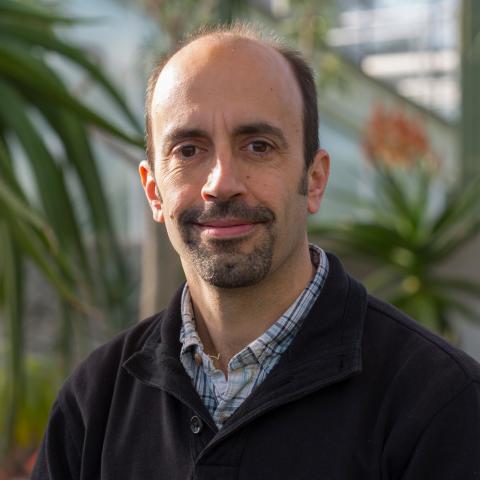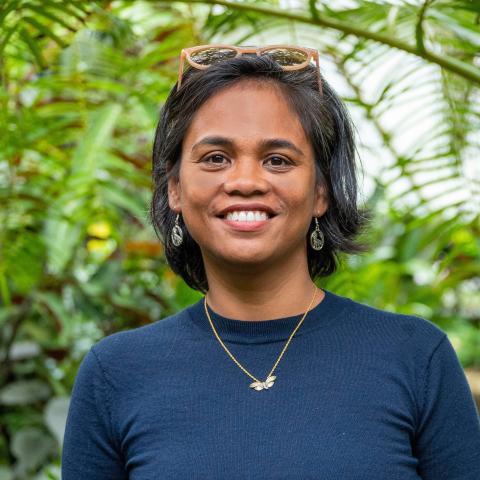Study options
- Starting in
- September 2025
- Location
- QMUL and Kew Gardens
- Fees
- Home: £16,500
Overseas: £29,950
EU/EEA/Swiss students
What you'll study
Learn the skills needed to kick-start your career in this exciting and rapidly-evolving field. This programme balances evolutionary biology, ecology, statistics, and conservation and restoration, with an emphasis on practical applications and training in biodiversity research. Modules cover examples from freshwater, marine and terrestrial ecosystems, and are taught by leading experts based at Queen Mary University of London and the Royal Botanical Gardens at Kew.
The programme starts with a set of core modules that are designed to introduce you to concepts and cutting-edge topics in biodiversity research, ecology and conservation. In particular, you will learn about the challenges and possible solutions surrounding biodiversity loss and conservation, including international policies and frameworks. You will also gain critical skills in data handling and statistical analysis, which you will be able to apply in your research project and future career.
You will then have a choice of elective modules that cover themes such as habitat management, ecosystem assessment, spatial analysis, emerging technologies, and conservation policy. By selecting between modules, you will be able to customize the MSc to pursue your personal interests and aims, with the opportunity to focus on restoration ecology or animal-based surveys, or to remain broad.
An important part of the programme is the overseas field-course, which is designed so that you can consolidate your skills, training and knowledge in either a terrestrial or aquatic ecosystem setting. Currently, we run three field-courses, from which you will select one. The first of these takes place on the island archipelago of Cabo Verde, off the west African coast. Here, working alongside Queen Mary staff and local communities, you will gain hands-on training in the study and long-term monitoring of marine vertebrates, including a globally important population of loggerhead turtles. The other two field-courses are both run in the rainforests of Borneo, and will provide you with an immersive experience of tropical biodiversity. The first of these options focuses on conservation and habitat restoration and is run by Kew staff, and the second focuses on animal ecology and conservation, and is run by Queen Mary staff.
Finally, you will complete an extended six-month individual research project, based and supervised at either Queen Mary University of London and the Royal Botanical Gardens, Kew. We try to be flexible with project topics, and will accommodate students’ personal interests wherever possible.
Additional costs
Field trip costs are included in the course fees.
Application deadlines
Structure
- Five compulsory taught modules and a field trip module
- Substantive six-month research project written up as a dissertation
Module videos
Compulsory/Core modules
This core module will introduce you to cutting-edge topics in biodiversity, evolution and conservation. In a series of interactive lectures and workshops, you will be taught by leading experts on the latest scientific advances in their respective fields. You will conduct a critical review on a subject of your choice, with potential topics covering marine and terrestrial species and ecosystems, evolution, and conservation. The module is designed to develop skills in critical thinking and scientific writing, and offers a firm foundation for the MSc programme. This core module is taught at Queen Mary University of London.
This module aims to provide a strong foundation in data analysis, visualisation and interpretation¿all critical skills in modern biodiversity and conservation science. You will be taught experimental design, statistical analysis (incl. ANOVA, correlation and regression), and basic bioinformatics analyses. Teaching in this module uses the software R, and typically comprises formal instruction in the mornings followed by practical sessions in the afternoons, in which you will gain hands-on experience of analysing real-world datasets. This core module is taught at Queen Mary University of London.
This module examines the causes and consequences of biodiversity loss from the landscape- to global-scale, alongside the strategies being adopted to mitigate and reverse these effects. You will learn about the impacts of climate change, pollution, habitat loss and agriculture, as well as national, regional and international policies and frameworks (e.g. EU Biodiversity Strategy, CITES, IUCN and Nagoya). You will be trained in how to evaluate data quality for evidence-based recommendations, and in grant writing for real-world projects, case studies, such as illegal wildlife trade and plastic pollution. Interactions with practitioners will offer direct insights into the pressing threats to biodiversity and its conservation. This core module is taught at both Queen Mary and the Royal Botanical Gardens, Kew.
The largest component of your MSc will be your research project, for which you will collect, analyse and interpret original data to produce a written dissertation. We offer a broad range of field-, lab- and computer-based projects that cover all aspects of biodiversity and conservation research. Previous projects have focused on terrestrial and aquatic ecology, genomics, evolutionary biology, animal behaviour, and species conservation. During this part of the programme, you will benefit from working closely with your supervisor and/or their research group members, and you will be based at either Queen Mary or Kew, or in some cases a partner institution.
Elective modules
Here you will learn how to work with genetic, geographical and biodiversity record data and how to draw conclusions about species distributions, status, and potential conservation approaches. There are three blocks of training: The survey and spatial analysis block teaches the main approaches to vegetation surveying and securing good quality data on which to base analysis of species distribution and status. Assessment will include production of a species distribution map. The conservation genetics block provides an introduction to theory and practice, and examines through case studies of plant and fungal diversity how genetic diversity information can inform conservation decisions. Conclusions are discussed in a group session. The final red-listing block provides training in the requirements for assessing extinction threat in plant and fungal species. The assessment includes preparing a conservation report and a preliminary red list assessment for one species. This is a professional competency using IUCN endorsed materials and approaches. This elective module is taught at the Royal Botanical Gardens, Kew.
Here you will learn the latest approaches to preserving plant diversity, the recovery of priority species, and restoration of habitats using UK and overseas case examples. The first week teaches the biology and practice of seed banking and cryopreservation, and the use of ecological horticulture for species reintroduction and recovery. The second week reviews the opportunities and approaches for restoring functional biodiverse habitats that will be resilient to climate change and will contribute to livelihoods and natural capital values. This elective module is taught at the Royal Botanical Gardens, Kew.
Tropical forests are the most biodiverse terrestrial habitats globally, and their loss is of exceptional conservation concern. This module will take place at a remote field station in pristine rainforest in Borneo, where you will gain first-hand experience of rainforest biodiversity and ecology. You will learn about the threats facing this unique biome - including forest fragmentation, logging and the expansion of oil palm - alongside the conservation efforts underway to protect and restore forest habitats. There is a strong emphasis on practical training in survey methods for different animal groups, including camera trapping, acoustic monitoring, bat trapping, and invertebrate sampling. You will spend most of your time in the forest, and there are good chances of seeing iconic species such as gibbon and orangutan, as well as nocturnal species during night safaris and walks. Teaching will consist of some lectures, given in advance in the UK, and small group field exercises in Borneo. You will also conduct a small group research project, allowing you to consolidate newly-acquired skills and knowledge gained from the wider programme.
The module will introduce you to new technological approaches for monitoring species, populations and individuals. You will learn about spatial analyses, including geographical information systems (GIS), as applied to studies of animal movement and habitats. As part of this, you will also look at the use of drones and GPS trackers, and will learn about technology-assisted monitoring approaches, including bioacoustics, camera trapping, environmental DNA sampling and genomics. Examples will cover animals and plants from terrestrial and aquatic systems. This elective module is taught at Queen Mary University of London.
You will learn the importance of tropical rainforest conservation and in particular the role of habitat restoration in maintaining and improving ecosystem services. You will learn a range of methods for collecting data through field surveys, specifically in relation to ongoing habitat restoration. You will learn strategies for ecosystem-based restoration, how restoration can alleviate impacts of climate change and the biodiversity crisis, and how to address socio-economic challenges brought about by habitat restoration to local communities. You will be equipped with knowledge including how to identify restoration opportunities, how to carry out rapid site assessments, and strategies for mitigating any negative impacts of restoration. The field course will include talks from relevant researchers, stakeholders, and policy makers all of whom are involved with local restoration initiatives. Your activities will include group field exercises, group-based mini-projects and analysis as well as the presentation of resulting data, both through write-ups and oral presentations.
The module focuses on the evolution, ecology, and conservation of sea turtles (mostly loggerhead turtles), cetaceans (whales and dolphins), and elasmobranch (rays and sharks). This module is designed to engage with activities undertaken by non-governmental organisations (NGOs) to protect marine species. As much as possible we will integrate local NGOs and conduct research activities that are part of their daily routine. We will discuss and demonstrate tracking solutions to follow those cryptic species including GSM/Satellite relayed trackers as well as the use of drones, and we will spend time in boats surveying cryptic species. For part of the field-course you will be working at night, assisting with long-term studies of sea turtles, including sampling for isotopes and DNA analyses. There will be lecture material given over the duration of the field course. Lastly, we will also engage with public engagement activities in the local communities as it is part of the day-to-day conservation efforts.
Ecosystems provide us with critical services, yet are under growing pressure from human activities. In this module you will learn about the characteristics, functions and management of ecosystems and habitats, and their responses to disturbance in the context of global change. Topics cover predator loss, invasive species, eutrophication and climate warming. Working across aquatic and terrestrial systems, you will learn about ecological, biogeochemical, molecular and ecological assessment methods for evaluating the consequences of local and global environmental changes on ecosystem processes. This module emphasizes an integrative approach that combines cutting-edge perspectives with hands-on practical training in essential components of the modern ecological toolkit. This elective module is taught at Queen Mary University of London.
Assessment
- 50% Modules
- 50% Research project
Modules will be assessed through an exciting and varied combination of essays, practical tests, group projects, statistics assignments, lab reports, field work, science communication pieces, presentations and a dissertation.
Research project
For your research project, you will collect, analyse and interpret original data to produce a written dissertation. We offer a broad range of field-, lab- and computer-based projects that cover all aspects of biodiversity and conservation research. Previous projects have focused on terrestrial and aquatic ecology, genomics, evolutionary biology, animal behaviour, and species conservation. You will benefit from working closely with your supervisor and/or their research group members, and you will be based at either Queen Mary, or the Royal Botanic Gardens, Kew, or in some cases a partner institution.
Overseas field trips
A highlight of the MSc is the opportunity to participate in an overseas field course. The first of these focuses on marine biology and takes place on the island archipelago of Cabo Verde, off the West African coast. The other two field-courses are both run in the rainforests of Borneo, and will provide you with an immersive experience of tropical biodiversity. Find out more on our Hub below.

—Queen Mary provided me with the tools and freedom to shape my future aspirations. Its close-knit community, emphasis on networking, and focus on transferable skills helped me grow as a scientist. My ambition is to pursue a PhD to bridge academic research with applied conservation and policymaking. Queen Mary has been instrumental in both my personal and professional development, and I am proud to be an SBBS alumnus.
Himmat Bakshi, Biodiversity and Conservation Msc graduate, 2024
Teaching
This course has been developed and is taught by world-leading experts, who are internationally recognised for research in plant and animal sciences. Each module is taught over a three-week period, with the first two weeks comprising an intensive combination of lectures, group discussions and practicals, followed by a week of private study in which to complete a substantive piece of assessed work.
To help you along your journey, you’ll also be assigned an Academic Adviser who will guide and support you throughout the course. You will also have the opportunity to attend our regular series of research seminars held at Kew and Queen Mary, which will provide a broad perspective of research across the biosciences.
Where you'll learn
Facilities
At Queen Mary and Royal Botanical Gardens, Kew you'll have access to a number of advanced facilities:
- At Queen Mary, you'll have access to laboratories housing state-of-the-art equipment for processing environmental and genetic samples, including mass spectrometry platforms for stable isotope analysis.
- At Kew, world-class resources include the Herbarium, Fungarium, Economic Botany Collection, Library, Millennium Seed Bank, Jodrell Laboratories, and the Living Collection that encompass gardens, glasshouses & nurseries at Kew and Wakehurst.
- Specialist analytical research facilities within our Centre for the Aquatic and Terrestrial Environment.
- Mesocosm and temperature-controlled facilities at Queen Mary
- The Genomics Facility, holds equipment for high-throughput sequencing.
- Network of partner NGOs, research labs and industries.
Campus
Mile End campus
You will undertake modules at Queen Mary’s Mile End campus in exciting east London. Mile End is the heart of our lively student community. Here you’ll be able to study and socialise with students and staff from over 160 countries around the world.
Royal Botanic Gardens, Kew
You will also study modules at Royal Botanic Gardens, Kew, a world heritage site. At Kew, you’ll experience first-hand the most diverse collections of plant and fungal specimens and associated biodiversity databases in the world. You’ll also have the chance to rub shoulders with their team of over 350 highly-skilled scientists, curators and technicians.
Accommodation
Kew Gardens is one hour by underground train from Queen Mary, with a service scheduled to run every 10 minutes, meaning movement between the two sites is easy. If you are interested in the animal or marine areas, you are best placed to live around Queen Mary, where you are most likely to have your project based. If you are most interested in the restoration ecology part of our programme, then it is most likely that your project will be based around Kew, so it is best to find accommodation there - Please contact Dr Kalsum Yusah (K.Yusah@kew.org) for further information.
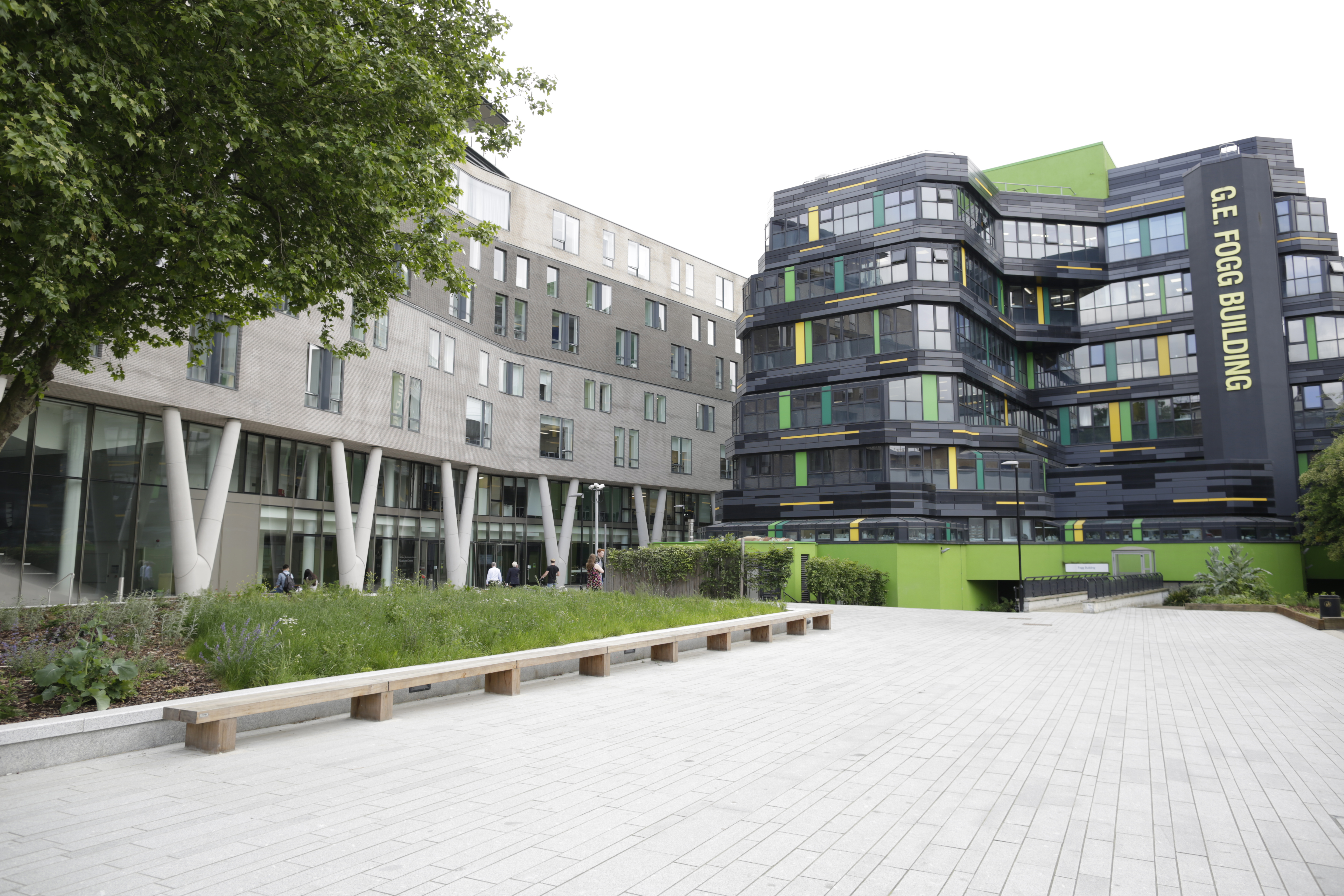
About the School
School of Biological and Behavioural Sciences
The School of Biological and Behavioural Sciences is one of the UK’s leading research departments, with a multi-disciplinary approach to teaching and research. We are a large and dynamic school with strong links with industry, offering students a stimulating and supportive learning experience.
Queen Mary University is also part of the Russell Group - a body of leading UK universities dedicated to research and teaching excellence.
We also collaborate with the School of Geography on the Centre for the Aquatic Terrestrial Environment (CATE). The facilities of which, some students can access for specific projects or modules.
Career paths
This MSc offers excellent preparation for students who wish to pursue a career in biodiversity research or the environmental sector. Opportunities include work in NGOs, government bodies, consultancies, charities, botanic gardens, publishing, and a wide range of public and research organisations, including universities and private companies. A substantial proportion of our MSc graduates go on to complete PhDs, while others move directly into permanent employment.
Our graduates can contribute to conservation, influence policies, conduct assessments, engage in community-based initiatives, preserve and restore biodiversity, pursue cutting-edge research, and make a meaningful impact on conservation and sustainability. The programme offers a rewarding professional journey with the skills, expertise, and network necessary for success.
- 93% of our postgraduate taught students are in employment or further study within six months of graduating (HESA GOS, 2017).
- 100% of those in work are in highly skilled employment and earning over the median salary (HESA GOS, 2017/18).
- £27,000 The median UK salary 15 months after graduating for our postgraduates (HESA GOS, 2021/22).
Fees and funding
Full-time study
September 2025 | 1 year
- Home: £16,500
- Overseas: £29,950
EU/EEA/Swiss students
Unconditional deposit
Home: £1000
Overseas: £2000
Information about deposits
Queen Mary alumni can get a £1000, 10% or 20% discount on their fees depending on the programme of study. Find out more about the Alumni Loyalty Award
Funding
There are a number of ways you can fund your postgraduate degree.
- Scholarships and bursaries
- Postgraduate loans (UK students)
- Country-specific scholarships for international students
Our Advice and Counselling service offers specialist support on financial issues, which you can access as soon as you apply for a place at Queen Mary. Before you apply, you can access our funding guides and advice on managing your money:
Entry requirements
UK
Degree requirements
A 2:1 or above at undergraduate level in n a relevant subject such as Biology, Ecology, Zoology, Plant Sciences, Biochemistry, Medicine, or Genetics.
Other routes
Applicants with a 2:2 degree may be considered on an individual basis provided they can demonstrate substantial experience in a relevant field.
Find out more about how to apply for our postgraduate taught courses.
International
English language requirements
The English language requirements for our programmes are indicated by English bands, and therefore the specific test and score acceptable is based on the band assigned to the academic department within which your chosen course of study is administered. Note that for some academic departments there are programmes with non-standard English language requirements.
The English Language requirements for entry to postgraduate taught and research programmes in the School of Biological and Behavioural Sciences falls within the following English band:
Band 4: IELTS (Academic) minimum score 6.5 overall with 6.0 in each of Writing, Listening, Reading and Speaking
Please note, there are some postgraduate programmes with non-standard English language requirements in this School.
We accept a range of English tests and qualifications categorised in our English bands for you to demonstrate your level of English Language proficiency. See all accepted English tests that we deem equivalent to these IELTS scores.
Visas and immigration
Find out how to apply for a student visa.



